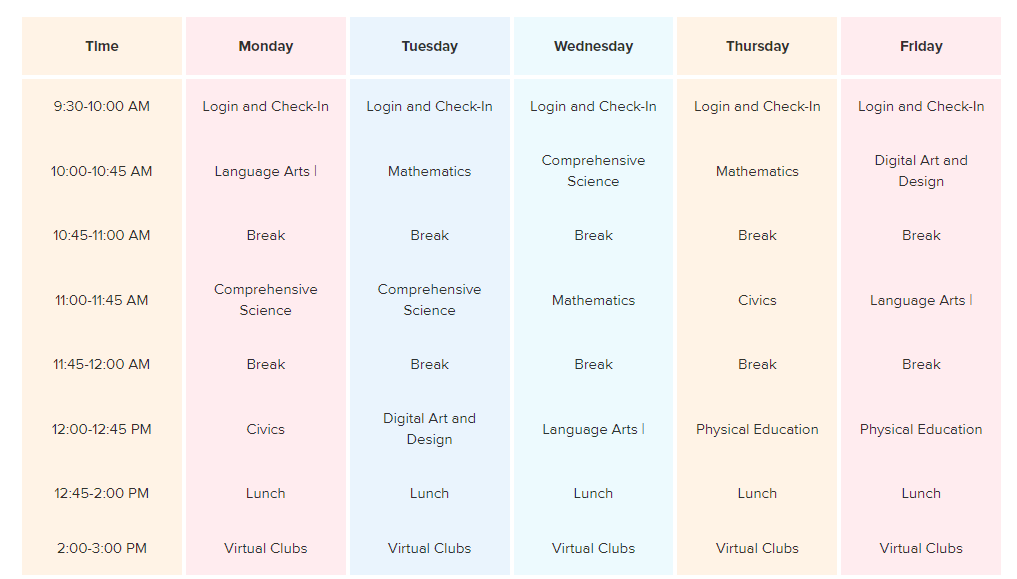Contents
- 1 More About Online Classes
- 2 Advantage of Online Courses for Middle School Students
- 3 The Structure and Format of Online Classes
- 4 Access to Resources and Materials
- 5 Assessment and Grade Policy in Virtual Education
- 6 Grade Policy
- 7 Choosing the Right Online Class for Your Child
- 8 Check out Legacy Online School programs:
What are online classes for middle schoolers? They are classes conducted over the internet/virtually without leaving one’s home. Middle school students who require homeschooling can study via online classes.
More About Online Classes
Online classes remove the physical boundaries of the traditional classroom. They let students learn anytime and from anywhere.
Digital classes provide flexibility in scheduling. They open up a wider range of courses to choose from their schedules. Courses include in-depth classes that are often unavailable at their local schools. This choice of unavailable classes is not without obstacles. Distractions at home can interfere with concentration and online learning. Online learning fosters self-discipline and adaptability. These valuable skills come in handy after high school but they must be nurtured since middle school.
Let us take a closer look at the strengths of online learning for middle school students with Legacy Online School.
Advantage of Online Courses for Middle School Students
The main point of interest for middle and high school students is the advantages in online education.
Advantages begin with flexibility. Flexibility means a student can shape their school day to fit their life’s needs. That’s possible to do through studying at any time from their home using an online course. Students get freedom and responsibility to build a schedule for themselves. They can study at a time where they find it best for their attention.
Online schools can take care of both students’ schoolwork and hobbies by granting academic freedom. For example, students play volleyball, drawing, or painting. Online revision does not slow them down in their hobbies. Instead, online education lets them balance their activities with their education.
Availability of a variety of courses is another significant advantage of online education. Online platforms are different from traditional schools. Online schools provide access to a wide range of subjects regardless of students’ geographical presence. This includes specialized or advanced courses that may not be available locally. Accessibility to unique classes opens up opportunities for students where they explore their interests. A broad availability can expand their knowledge beyond the standard curriculum.

Personalized learning experiences
Self-paced nature of online classes opens up opportunities for individualized learning. Students can learn at a pace that suits their learning style. Brittany Gilbert underlines that personalized learning experience assists students through their personalized learning capabilities.
“Understanding one’s learning style and skills will allow students to more accurately determine if online learning is suitable for them. Instructors and course designers will also benefit from understanding the aspects of a course that increase students’ understanding and participation.”
– Brittany Gilbert, St. John Fisher University on “Online Learning: Revealing the Benefits and Challenges”
Students have the freedom to adjust their pace instead of having a fixed class pace. Personalized approach accommodates different learning styles and empowers students. Personalized learning does this by creating an environment in which students can thrive by capitalizing on their strengths and preferences.
Online courses foster an inclusive environment. Online education greatly benefits both middle and high school students. Programs online offer flexibility and specialized courses. They unlock each student’s potential and promote their holistic development.
Challenges and Solutions in Virtual Learning
| Challenge | Solution |
| Isolation. Children want to hang out with their friends. They miss discussions with their peers and teachers. Students will miss in-person interactions, which can lead to their social development being affected. | Boosting Social Interaction. Parents can schedule virtual study groups or extracurricular activities that encourage students to socialize. Encouraging participation in online clubs or forums will help students to connect with peers outside classrooms. |
| Distractions. Students will be distracted at home by their at-home situations. Distractions prevent them from focusing on their studies. | Minimize distractions. Set up a dedicated study area for your child that is free from distractions. The area can be a quiet corner in the house. Children can focus only on their studies there without the temptation of TV or video games. |
| Lack of supervision. Students need high self-discipline skills and time management skills to not struggle without structure. Parents and children both must establish a specific schedule on their own. | Creating Time Management Strategies. Create a daily schedule. It should include study time, breaks, and other activities. Teaching kids to prioritize tasks and manage their time well will set them up for success. |
Understanding these challenges and using suggested solutions will help parents and their children. They can navigate the virtual learning process with preparations already in place.
The Structure and Format of Online Classes
Online classes for middle school students are designed to meet their needs. Virtual classes typically combine video lessons, interactive assignments, and discussion forums all to engage and motivate students. This distant format gives students more autonomy in learning. Online classes also give them the opportunity to communicate with teachers and peers in real time.
The use of video lessons is one of the hallmarks of online classes that allows flexibility. Teachers create videos to explain key concepts. Video lessons allow students to internalize the material in a fun way. Video lessons can be paused, rewound, or rewatched as many times as needed. This flexible style allows students to learn at their own pace.
Interactive Assignments
Online classes include interactive assignments. Assignments encourage active participation and critical thinking. Online assignments may include quizzes and projects. Additionally, they include collaborative group work and creative assignments. Interactive lessons are made to fit different learning styles. Students can put what they have learned into practice by completing these assignments. Teachers improve interactive lessons based on individual feedback.
Live Virtual Sessions
Online classes feature live virtual sessions. These sessions allow for real-time interaction between instructors and peers. Live communication fosters a sense of community in the classrooms. They provide opportunities for immediate clarification of doubts or questions.
The advantage of these sessions includes mimicking the classroom environment. This allows for direct interaction through a digital platform. Students ask questions, participate in discussions, and connect with their peers.
Asynchronous Learning
Online education usually offers asynchronous learning opportunities. Asynchronous classes mean that students access course materials on their own schedule. This flexibility allows students to manage their time effectively and accommodates various personal commitments outside of school.
Access to Resources and Materials
Middle school students can take advantage of a variety of digital tools thanks to online learning. Students can get e-books, educational websites, and multimedia materials that offer learning opportunities. This opportunity is an essential benefit of online education compared to traditional schools.
Online resources adapt to different learning styles. For example, some students are more interested in reading e-books with interactive elements while others prefer to watch instructional videos to understand complex concepts. Adaptability contributes to inclusive learning styles where students can access information according to their individual preferences.
Moreover, digital resources often offer dynamic, real-life examples and case studies. Information is not easily found in conventional textbooks in a traditional school setting. Exposure to different perspectives and authentic scenarios will broaden students’ understanding of different subjects. Additionally, online platforms offer practice materials with tests and exercises. Practice materials assist students with active participation and offer instant feedback to track their progress. Children can immediately understand where they must improve thanks to instant feedback without waiting for teachers’ commentary.
Grades and assessment of work are the next topic.
Assessment and Grade Policy in Virtual Education
Assessment in a virtual classroom has online quizzes, exams, and projects. These methods help educators evaluate the students’ understanding of the material being taught and are vital for tracking their progress and performance. Many virtual education programs use continuous assessment techniques. These techniques include active participation in virtual discussions and completion of interactive assignments. Regular online quizzes check knowledge quickly and gauge comprehension. Exams provide a more thorough assessment of the students’ learning. Project submissions promote creativity, critical thinking, and analysis.
This mode of assessment has a big advantage. It allows for customized feedback on strengths and areas needing improvement. Students can get quick feedback on their work. This lets them think about their performance and improve their skills. This feedback loop is constant. It fosters a proactive approach to learning. It ultimately supports growth.

Grade Policy
Grade policies in virtual education programs vary on each educational establishment. Grade policies depend on scores from quizzes, exams, and projects. These scores contribute to the overall assessment of a student’s progress. Grades remain the key factor in measuring academic progress. That’s why both students and parents must understand the grading criteria.
Virtual education underlines the importance of virtual discussions and students’ participation in them. These discussions are part of the evaluation process. Engaging in insightful online conversations encourages critical thinking, communication skills, and knowledge application.
This program’s main goal is to fairly and accurately evaluate each student’s abilities and achievements.
Understanding how online learning platforms support students gives insight into their workflow. The workflow shows the many approaches that create a supportive learning environment. Frequent evaluation and feedback are key for online education.
Choosing the Right Online Class for Your Child
Choosing an online class for your middle schooler is a big decision. The end result can affect their learning and academic growth. Every parent must consider several factors written down below.
See for yourself how Legacy Online School handles course selection for middle schoolers by clicking here. Check out what we’ve got! Here is a glimpse.
Accreditation plays a critical role when choosing an online class.
Look for accredited programs. They should be recognized by educational bodies. Accreditation ensures that the program meets quality standards and gives your child a good education. This is especially important if your child plans to return to a traditional school.
Qualifications and experience of the instructors.
Dedicated, qualified educators have online teaching experience. They greatly impact your child’s learning. Ask about the teachers’ credentials. Also ask about their expertise in virtual education.
Diversity of courses offered.
Many courses cover a wide range of topics. They let your child explore their interests and diversify their learning. Look for programs offering a wide range of subjects, including core academic courses and elective options.
Proficient support service.
Support services ensure a child gets needed help during their online learning. Services like that include tutoring, counseling, tech support, and resources for students. There are also services for students with special needs. A program with strong support services ensures that a child gets personal attention and gets help when needed.
Support services become an essential part of any child’s education as they can help them where their parents may not. OnlineEducation speaks about their interview with Dr. Stacey Ludwig-Johnson, associate provost for Academic Services at Western Governors University (WGU), who underlines the importance of support from professionals.
“It goes without saying that online programs meet the needs of students that can’t attend on-campus courses due to schedules, location, or even disability. The convenience of online learning, coupled with the opportunity for proactive support from faculty and advisors, really encourages student success.”
– Dr. Stacey Ludwig-Johnson from his interview with OnlineEducation
Making this crucial decision for your child will be daunting. It’s crucial to align the program with your child’s style and interests. You must seek insights from other parents who have experience with the programs you’re considering. Online reviews can show the strengths and weaknesses of programs as they provide valuable insight.
You can make an informed decision by carefully evaluating these factors and your child’s traits and preferences. Consider this when choosing an online class for your middle schooler. Finding the right fit is key. It can make all the difference in creating a positive virtual learning experience.
The online class you choose for your child should match their interests and how they learn. It should provide robust support services. This will contribute greatly to their success in virtual education.

Check out Legacy Online School programs:
- Legacy Online School’s elementary school program sets the bar high. This is a quality education. We strive to ignite curiosity. We also strive to foster creativity. We offer a strong curriculum. We are assisted in this by qualified educators.
- Legacy Online Middle School provides digital education. It is designed for middle school students. The school prides itself on offering live online classes taught by certified teachers. The classes are online and interactive.
- Legacy Online High School is a unique method of online learning carefully designed for high school students. It combines synchronous learning, a wide range of pedagogical methods, and an emphasis on accessibility.
Legacy online school offers the best curriculum for you and your child to get the best online educational experience.
Our rigorous curriculum ensures that graduates are well prepared for universities and workplaces around the world. In addition, our vibrant virtual clubs connect students all around the world.






